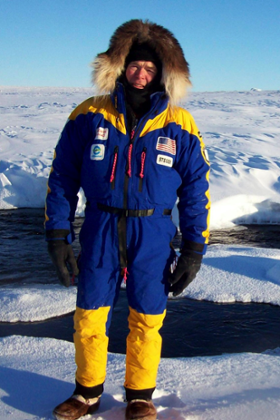 Will Steger
Will StegerAs readers know, I often focus on the story, and history, of someone who makes an impact in climate change. This is the third such article and I think you will agree, it shows that it isn’t just lab scientists and academics that are shaping the conversation about climate change.
Will Steger really rose to prominence as he led ventures to explore the polar regions of our planet. But those adventures were years in the making; they began in his childhood. Will was one of nine kids raised by parents who encouraged exploration. As long as Will stayed out of trouble and succeeded in school, he had very few limits placed on his activities. In 1957 when Will was 13, he would document meteorological activity in journals at night as part of the International Geophysical Year, in addition to nature drawings of close up flowers and other aspects of the natural world. By 15, he was inspired by adventures of Huck Finn and his National Geographic magazines to travel with his brother down the Mississippi River. It was his first (and last) motorized expedition.
In college, Will fell in love with geology and begin to explore the world more seriously. He graduated with a B.S. degree and began a teaching career which included climate change. But, it was in the wilderness that he began to make his mark.
It was Will’s early observation of the natural world and his curiosity of weather and climate that eventually enabled him to explore and survive in the Arctic. It is likely that no one has more first-hand experience in the Arctic and Antarctic than Will. He has traveled tens of thousands of miles by kayak and dogsled – leading teams on some of the most significant polar explorations our world has ever known. He was awarded the Lifetime Achievement Award from National Geographic Magazine, the inspiration from his childhood, in 2007.
Will Steger joined Amelia Earhart, Robert Peary and Roald Amundsen in receiving the National Geographic Society’s prestigious John Oliver La Gorce Medal in 1995 for Accomplishments in Geographic Exploration, Accomplishments in the Sciences, and Accomplishments in Public Service to Advance International Understanding. This was the first time the Society presented these three categories together and this award has not been given since.
 Will Steger
Will Steger
Among his accomplishments are the first confirmed dogsled journal to the North Pole without resupply (1986), the longest unsupported dogsled expedition in history (1600 mile traverse of Greenland in 1988), the first dogsled traverse of Antarctica (3471 miles in 1989-1990), and the first dogsled traverse of the Arctic Ocean in one season (1995).
In this era of satellite sensing, we can see to every corner of the planet. But, we still gain much from the firsthand witness of human explorers. Who better to be a witness than Will Steger? In fact, following his expeditions, Will changed his life trajectory by embarking on an ambitious new agenda to improve childhood education. In 2006, he founded the Will Steger Foundation. This foundation deals exclusively with climate change by working with youth, educators, decision makers, and the public to foster climate literacy. Each year, the Foundation reaches over 1,000 educators through their programs and today they count over 5,000 youth who are engaged in creating solutions on their campuses and in their communities.
When I spoke to Will recently, he said,
Part of our public outreach and policy work requires I give a lot of talks about my eyewitness account of climate change. I also work with policy makers in support of clean energy and jobs. Among the silver linings in all of this is that there are tremendous benefits to local economies that result from transitioning from a fossil fuel economy to a clean energy one.
In Minnesota, where the bulk of Will’s work occurs, the impact has been felt. Minnesota has a set of nation-leading laws passed with broad bipartisan support in 2007. There is a Renewable Energy Standard, which requires at least 25% of electricity to come from renewable sources like wind and solar by 2025. Minnesota also has smart energy efficiency goals to ensure we use our energy more wisely. The goal is to reduced carbon dioxide emissions 15% by 2015, 30% by 2025, and 80% by 2050. Along with a cleaner environment, increases in high-paying jobs in the renewable energy industry have arrived. Will’s work, and the results in his state show that we can solve the climate/energy problems in a way that improves the economics of the region.
I asked Will about the struggles he has observed. He told me,
Posted by John Abraham on Wednesday, 15 October, 2014
 |
The Skeptical Science website by Skeptical Science is licensed under a Creative Commons Attribution 3.0 Unported License. |